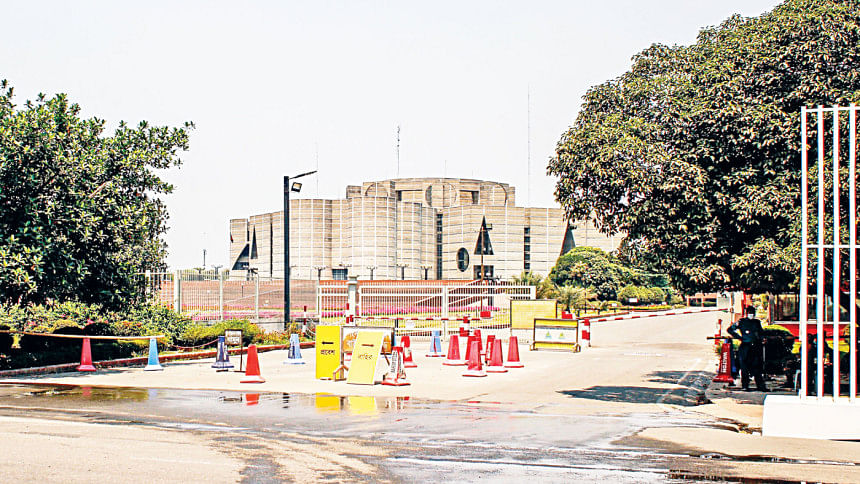Next fiscal year’s budget priorities must be aligned with the needs of the pandemic-hit economy

The coronavirus-infected economy requires dealing with the disease burden and the economic devastation caused by measures to contain the virus.
The combined supply and demand shock cannot simply be countered by expansionary macroeconomic policies. Measures to improve the quality of regulation and public service delivery are equally important.
The focus of fiscal 2020-21's budget must be to limit the damage due to shaky business and consumer confidence rooted in the fear of the virus.
Large fiscal packages are needed to expand healthcare provision, protect payroll, delay tax payment, avert unnecessary bankruptcies, shore up the financial system and help the informal sector households survive the pandemic.
We need to ramp up the capacity of the health system to deal with health risks. The physical and human capital deficits in the health system at the national and local levels are painfully evident.
Restructuring existing health-related expenditure to focus more on COVID-19-related capacity building is needed, but not at the expense of reducing the provision of non-COVID-19 care.
Fiscal policy can play a supportive role in slowing the spread of the virus.
The binding constraints are mostly technological and institutional.
The challenge is to nudge incentives of the actors, open entry points for wider collaboration and provide funding for procuring tests, tracing technology, isolation, treatment facilities, PPEs, drugs, and vaccines (when available).
The decision on the level of these existential spending must err on over rather than underbudgeting. It could be 2-3 per cent of GDP if the institutional capacity permits.
The losses suffered by the poor and the vulnerable are tremendous. A large proportion of the households don't have enough cash and food to survive.
Existing and new cash transfer programmes need to be funded to reach the affected poor and the vulnerable in the urban and rural areas.
The targeting strategy has to broaden outreach to increase the number of beneficiaries. Benefits per person also need to increase to reverse the COVID-19 impact on poverty.
Keeping businesses afloat is the other challenge. Many of the measures taken by the Bangladesh Bank (BB) and the government are in the right direction.
They are short of what is needed until both the global and the Bangladesh economy get moving.
BB is partially refinancing bank loans under directed interest rates without sharing risk.
Making this work may require increased reliance on state-owned banks because they benefit from implicit government guarantees.
Stronger governance and accountability of public banks will be needed to produce the intended results.
The crisis has exposed the administrative weaknesses in delivering fiscal support. This is glaring in the food distribution system and the delivery of financial support to businesses.
To increase the probability that those who need the support get them, the assistance package should err on the side of simplicity in regulation and delivery.
The challenge for the announced assistance packages is to achieve the best trade-off between speed and targeting.
Bangladesh has excelled in the past in doing both by forging partnerships between the state and non-state actors. A coordinated effort is not visible yet.
Assisting economic recovery amid uncertainty about the virus spread is a double-edged sword.
Its success in assisting the recovery could end up steepening the spread curve if the mitigation measures are undermined.
Focus on building resilience by investing in food security, economic diversification and education will be critical.
The United Nations has warned that coronavirus protective measures could jeopardise food security around the world.
The government must ensure that the country has enough food stock and people continue to have access.
The current food stock and hopefully a good boro harvest should not breed complacence.
Rising food export barriers and stockpiling by countries may create volatility in international food markets.
Keeping the prices of the essentials affordable through proper market intervention will be needed to ensure food security.
Agricultural activities could be affected in poultry, livestock and fisheries by the need for more than usual social distancing.
Policy support, both fiscal and regulatory, will be needed to keep functional the complex web of food producers, input supply, processing plants, transportation and internal trade.
COVI-19 has unmasked the economic and social risk of depending on one sector for the bulk of exports and employment. Both policies and politics get beholden to the sector.
Several industries will emerge from the pandemic. These include manufacturing, e-commerce, global services sector, health care and biotechnology, logistic services, renewable energy and agriculture.
Each of these could provide investment opportunities.
Coronavirus has brought to the fore the criticality of vibrant agriculture, agribusiness, digital economy, manufacturing, and logistics. We have to begin to take full advantage of the tools, skills and new technologies.
We need enhanced skill development efforts in the post-COVID recovery period.
Before the outbreak of the pandemic, Bangladesh was already in a learning crisis as evidenced by high numbers of learning poverty.
The education system is facing a new storm with school closures impacting millions of children and youth. The closure coincided with a key assessment period.
COVID-19 spread may happen in waves. Preparedness is crucial. This includes introducing protocols for screenings in schools, rolling out hygiene practice campaigns, imposing school closures, offering distance learning and using closed schools for emergency purposes.
All these have budgetary implications that will need accommodation.
Educational administrators and policymakers need fiscal support to introduce new learning modes that can reach everyone, to prepare for emergencies and to make the system more resilient.
Supporting aggregate demand demands creative thinking. This is not a normal slowdown.
Stimulating demand above the constrained capacity may lead to rationing and inflation rather than an increase in activity.
The concern about supply constraints is not a major issue if much of the spending goes toward redistributive items such as buying food, making utility, rent and debt repayments.
Even if there are some rationing and inflation, the outcome will still be desirable if poorer households have enough to eat.
Boosting aggregate demand beyond disaster relief is not wise if conditions are not right.
When confidence returns locally and globally, there will be pent-up demand from consumers who postponed buying nonessentials.
However, concerns about the possible return of restrictions, if the infection rate continues to rise, will likely lead to precautionary saving by consumers and low investment by firms.
The government should be ready to act depending on which way the demand goes. This is tricky in a dual budgeting system with process inflexibilities.
Will the government be able to mobilise the necessary resources? Opportunities for increasing tax revenues are limited.
Tax cuts should, in fact, be preferred to expenditure increases when the two deliver equivalent amounts of cashflow benefits. This will save transaction costs, ease access barriers and increase liquidity.
The fiscal space may shrink due to revenue reducing policy response for containing the spread and the economic impact of the virus.
A broad range of essential medical products needed in the treatment of COVID-19 cases is still subject to import duties and taxes despite the government's removal of tariffs on 17 medical products.
Reducing taxes on all essential goods and raw materials including medicines, ventilators, hand sanitisers, surgical masks, personal protective equipment and staple food items for next fiscal year deserves serious consideration.
A combination of austerity, international financial assistance and exchange rate flexibility can smooth the adjustment.
Fiscal austerity measures, including exploring opportunities for savings from non-essential non-development and development expenditures, will help.
Small savings from several line items in the budget, particularly subsidies, block allocations and low priority projects in the annual development programme could add up to something substantial.
The austerity measures are unlikely to be enough to prevent a rise in the budget deficit.
We should not hesitate to run a deficit when it is required to reverse the increase in poverty and maintain output at the potential.
Increased hunger and bankruptcies of the small guys are not acceptable outcomes. A relatively low debt economy can well withstand any increase in debt needed to prevent such outcomes.
Accessing the new avenues of international assistance, including seeking suspension of bilateral debt service payments, opened by COVID-19 can ease the burden.
The government has reportedly approached the Asian Development Bank, the International Monetary Fund and the World Bank for about $2.5 to $3 billion support from their COVID-19 emergency and concessional funding windows.
Given that the needs are larger, it is difficult to understand why, as reported in this newspaper on May 7, the finance ministry has decided not to avail the temporary debt service suspension facility extended by the Group of 20 major economies.
The G20 nations are offering to freeze bilateral government loan repayments until the end of 2020 to help tackle the health and economic crises triggered by the pandemic.
If Bangladesh avails the facility, it could potentially defer paying about $300-350 million in debt obligations to the G20 countries.
The suspension period starts from May 1 and lasts until the end of 2020.
Creditors may consider a possible extension during 2020.
Both amortisation and interest payments will be suspended. The repayment period will be 4 years, with a one-year grace period.
The conduct of monetary policy cannot be subordinated to the vagaries of the foreign exchange market at a time like this.
Increasing exchange rate flexibility to tackle excess demand for foreign exchange will preserve taka liquidity in the banking system. This will help accommodate domestic financing of the deficit.
Transparency is needed to make sure increased regulatory forbearance, fiscal and monetary expansion do not enhance macroeconomic risks, inflation and financial stability in particular.
BB has slipped in updating and reporting data on key economic indicators of late. Lags are growing. Central banks all over the world have not stopped macroeconomic monitoring and disclosure because of the virus. BB must not fall behind.
The writer is an economist

 For all latest news, follow The Daily Star's Google News channel.
For all latest news, follow The Daily Star's Google News channel. 



Comments